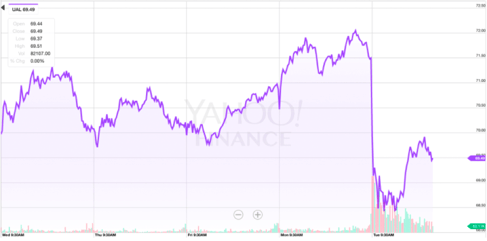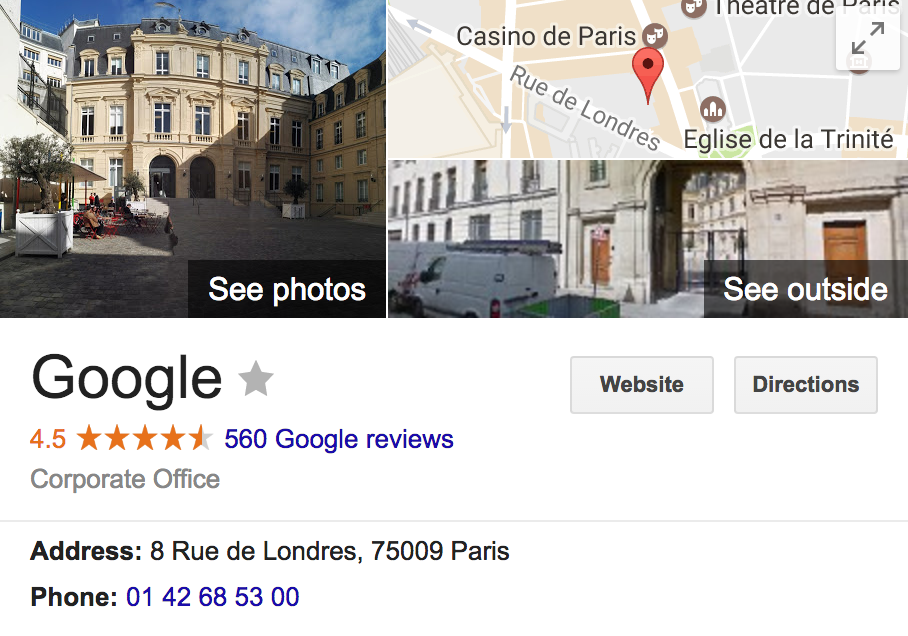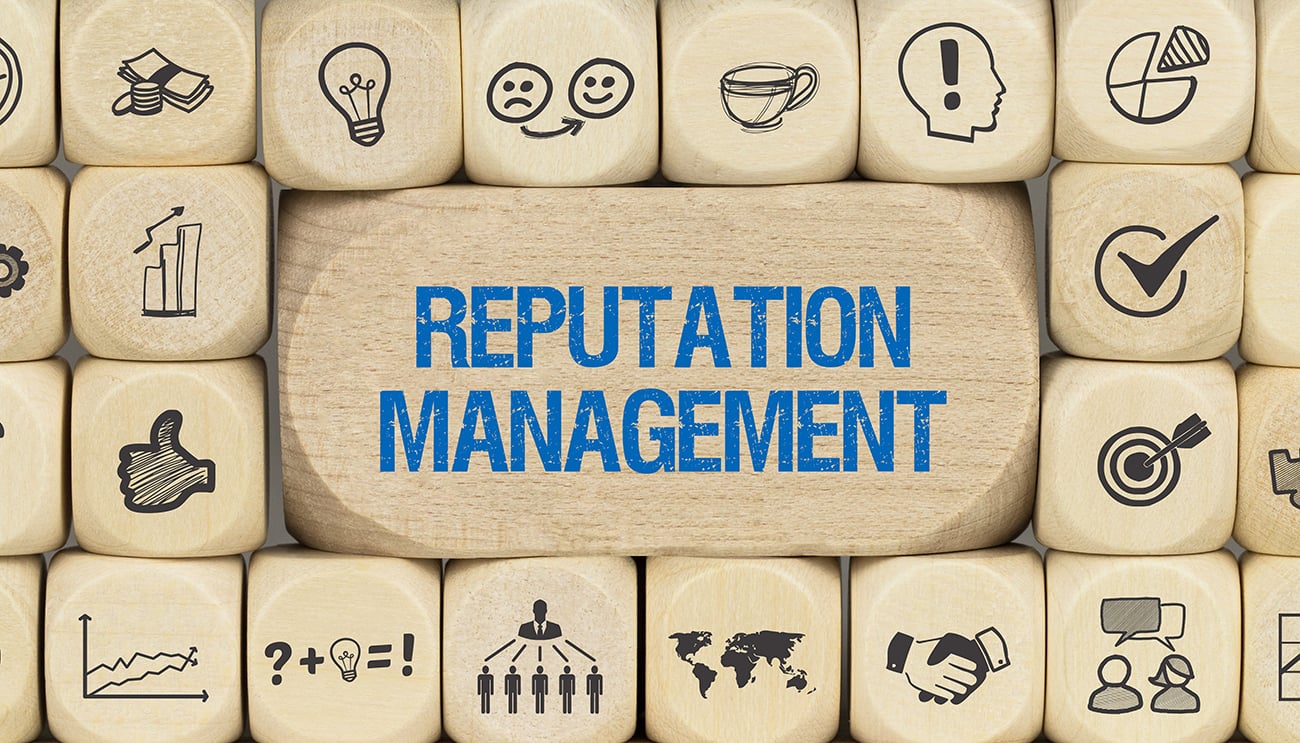What exactly is reputation management? Reputation management is the effort to influence what and how stakeholders think of a brand or person. To a large extent, reputation management seeks to influence peoples sentiment by changing what they see during search, social, and other online interactions. Reputation management can also affect the offline world as well.
Definition of reputation management
The above definition covers what reputation management is at its core. But of course, there is much more to it. In this section, we’ll build out this nascent definition of reputation management by explaining seven critical aspects:
1. Reputation management happens mostly online
A vast amount of communication happens online. We meet friends, we solve disagreements, we discover new businesses, and we read the news. We even spend our leisure time online. It’s inevitable, therefore, that reputation management happens mostly in the online space; in fact, the terms reputation management and online reputation management are now virtually synonymous.
So reputation management happens online because that’s where the majority of our communication happens. But there’s another reason as well, in the online world one doesn’t focus on changing minds individually, instead, arbiters of reputation like Google, Yelp, online publications, and YouTube are often targeted.
2. Reputation affects sales and marketing
Reputation management as a practice resides within the wide world of sales and marketing. Why? Because what people think of a brand influences everything about that brand. It’s nearly impossible to sell a product to a clientele that doesn’t trust or believe in your brand.
3. Online reputation is essential for a business’s survival
We’re not overstating the case when we write that reputation management is essential for a company’s survival. Enron vanished in the wake of corruption and the ensuing public relations backlash . Other giants like BP, Wells Fargo, and United Airlines have been able to withstand reputation blowups, but not without serious costs.
These are all examples of how the emergence of online communication platforms has made reputation more delicate. Whereas before people who had a bad experience with a business may have only told a few close friends, now they have the ability to publish their views online, where they can reach thousands, even millions of people. These days, a single badly handled situation can quickly plunge a company into bankruptcy.
United Airlines
As you may remember, in the fall of 2017, officers forcibly removed a passenger from United Airlines flight 3411 from Chicago to Louisville. Following the massive negative public exposure, investors watched in horror as United Airlines hemorrhaged nearly a billion dollars in market cap value.

United Airlines is still flying the skies, but not without a permanently marred reputation. Other companies — smaller ones, or less capably equipped ones — would simply crash and burn in the wake of this kind of reputation disaster.
4. Reputation is important both for personalities and businesses
We’ve mostly focused on reputation management as it applies to businesses thus far, but it’s important for individuals too. It’s an area of interest for the billionaire hedge fund manager attempting to cover up an extramarital dalliance gone public. It’s critical for the singer who accidentally made a big real estate photography mistake even bigger – in fact it coined a new term, the Streisand Effect.
Since personalities often are businesses, it makes sense that they would benefit from reputation management. Most people in the modern world cannot live their lives in anonymity. If people know your name, they’ll Google your name. It’s just what people do.
They’re not just Googling your name. They’re also reading your business’ reviews and talking about your brand on social media. With all of these different channels at play and, honestly, ways to quickly trash your reputation, it’s essential to take an active stance to show your best side online. The image that is portrayed when your name or company is typed into a search engine can help or harm you. People are binary in their judgment – there is often no in-between.
Those of us without an outsize personality or billions to our name can sometimes afford to manage our reputations ourselves, it’s called DIY reputation management. We’re good to go after posting a flattering photo on Facebook, an Instagram highlights reel, or a resume on LinkedIn that only slightly exaggerates our finer points. People do it every day, especially influencers.
5. About 87% reverse a purchase decision if there are reputation issues
It’s no surprise, then, that businesses shell out tens of thousands of dollars a month in an effort to preserve or improve their reputations. If you knew you could prevent a potentially devastating crisis, wouldn’t you pay the comparatively small price for a good reputation?
Who’s in control of your reputation?
Perhaps the most salient reputation management question to answer is Who’s in control of your reputation? This is the single biggest sticking point in understanding reputation management, and it’s a huge reason why reputation mismanagement is so rampant. Misunderstanding this crucial first point leads to a multitude of sins, false steps, confusion, and outright blunders.
There are plenty of options for managing your online reputation. You can invest in reputation management software, contract a reputation management company, or take a DIY approach. Whatever method you choose to manage your reputation, there are a few basics that are helpful for developing your reputation strategy.
When developing a reputation strategy, the first step is to understand where your reputation lives. In today’s digital world, your reputation is unfolding in many places. These various platforms can be difficult to manage.
These platforms are the building blocks that form your digital reputation. People go to these websites to find information, connect with like-minded people and to make purchases. It is crucial that you take steps to manage your brand’s reputation on these platforms. If negative news about your business appears on one or more of these websites, it can cripple your business.
What do you control about your reputation?
In terms of your business’s reputation, you control your business’s or personal brands’ (your own) actions. And it’s possible that even on that point, your control is limited. A restaurant may have a reputation problem for years because a waiter was having a bad day.
Though you control some things in running a business, you don’t control everything. You can’t. And that leaves your reputation in the hands (more precisely, the minds) of those who perceive your company. But when a negative review hits Yelp, you may have some control over who sees it and how often. It’s even possible to delete some negative reviews.
The actions that you undertake as a business leader do shape reputation in some way. If, for example, you decide to embezzle millions of dollars, put cyanide in your donuts or openly support weapons smugglers, these actions will have a marked impact on your reputation.
- Assess your current situation: Start by simply Googling yourself or your company. Take note of what comes up and whether your search results are mostly positive or negative. There are reputation monitoring tools to help as well.
- Monitor your search results: Keep a careful watch on what is being said about you online. Respond to comments whether they are positive or negative. If they are negative, work to improve the problem to avoid repeating it in the future.
- Create positive content: Focus on the channels you can control (your website, blog, social media pages) to create positive content. Reviews can often be improved fairly quickly using review management tools.
- Focus on your brand: Your overall brand is key here. Be transparent, and work from the inside out to make sure that your brand is what you say it is online.
What don’t you control about your reputation?
Even if your actions are cautious, circumspect, and limited in their scope of impact, your reputation takes on a life of its own in the public mind. Your competitor across the street often has more sway over your business than you do (fake reviews for example).
To make this point, let’s use a simple example. Let’s say you run a spaghetti restaurant. Quality, sanitation, employee training, recipes, ambiance — you’ve worked hard to make sure that everything is perfect, that your sauce is well-seasoned and that your spaghetti is piping hot when served.
One day, you serve a customer your tastiest spaghetti dish at the normal serving temperature of 113 degrees. The customer, unfortunately, was expecting their plate of noodles to be 119 degrees. Early in life, they had a horrible experience with colder-than-expected pasta, a memory that is now mixed up with being cut off from their family, experiencing poverty and losing their hair. The customer rises up from the table in a rage, accusing you of being the worst spaghetti restaurant in the entire Western Hemisphere, spitting their spaghetti back into the dish, and causing all the other restaurant patrons to gaze at their own noodles with horror and revulsion.
Instantly, your restaurant’s reputation is suspect. Even if the other customers enjoyed the dish, their experience at the restaurant is forever tainted by the customer with some unfortunate life experiences and maladjusted expectations. Your reputation may suffer.
The incident tragically resulted in the death of one passenger. Upon investigation, it was found that the faulty engine was compromised due to metal fatigue, an issue that was beyond the scope of even the most rigorous routine inspections.
What is reputation management?
Online reputation management (ORM) is a discipline that uses search engine optimization techniques to influence the search results of a company or individual in order to shape brand perception.
Jonas Sickler, ReputationManagement.com
Most business leaders believe a positive reputation is important. However, they often fail to recognize that Google search is a key driver of their reputation. Furthermore, executives rarely understand how to effectively influence online sentiment, or measure its financial impact on their company. As a result, business owners rarely take action to manage their online reputation, leaving it to chance.
To make matters worse, there’s also a lot of confusion about whether public relations firms or SEO companies are better equipped to tackle ORM. So, let’s dive into how ORM is different from search engine optimization (SEO) and public relations (PR).
Online reputation management vs SEO
Most businesses are familiar with SEO as a means of driving organic traffic by influencing keyword rankings. In fact, according to a Forrester Consulting study commissioned by Terakeet, 81 percent of executives moderately-to-strongly agree that SEO will become an increasingly more important priority over the next 12 months.
SEO is used to rank multiple pages on one website for many different keywords. While online reputation management is used to rank many different websites for a small set of branded keywords. Here’s another way to look at it:
The goal of SEO is to rank a single website number one for as many queries as possible. The goal of ORM is to fill the first page of Google with preferred content for brand-focused keywords. Think of it like this: reputation management is one inch wide and one mile deep, SEO is one mile wide and one inch deep.
Reputation management vs public relations
The difference between online reputation management services and public relations is a little more nuanced. On the surface, it may seem like ORM is just public relations for online personas because they have similar goals, namely brand management. However, these two disciplines use different tactics to achieve different results.
Public relations companies generally create trending, buzzworthy news cycles to redirect the conversation around negative topics. The goal is to shift public perception by flooding social media and news outlets with a new viral narrative. Whereas online reputation management aims to tell a more accurate and holistic story about a brand or individual by positioning controllable assets on the first page of Google.
The best tools for reputation management
-
- : If you care about your business on review sites, this is great! It gives you a single account from which you can manage all your review profiles, including Yelp!, TripAdvisor, and the other big names. It’s annoying to have to move around the web, checking each site individually. Plus, you’re bound to miss things. With Reputology, you won’t.
- Mention: If you care about more than review sites (and you should), Mention has you covered. The tool monitors the web, social media, forums, blogs, and even television. And Mention users have access to Reputology’s range of sources, so you’re able to track reviews in the same place as all the rest. Talk about a time-saver!
- The Brand Grader: This is a fun, free tool we built to give anyone a snapshot of their brand online. It’s not comprehensive, but you’ll get an idea of sentiment towards your brand, how your social profiles perform, and a few other key stats. Plus, it’s instant, and you don’t have to sign up for anything. Nice!
- SimilarWeb: This is a great tool to compare one brand’s web presence with another. By just using their free tools, you’ll know how much traffic your competitors receive, where their traffic comes from, and how they rate within your industry. The paid version lets you create custom reports and monitor your competitors with precision. And the more you know about the other businesses in your industry, the more you can do to build your own presence.
- A CMO’s Guide to Online Reputation Management
It can be hard to convince management that you need to pay more attention to how your company is perceived online. This post speaks the language of the C-Suite and makes it clear why your CMO should care. - Brand Reputation: How Leading Businesses Protect Their Image Online
Don’t just take it from us. Learn how three successful businesses take care of their online reputations. - Reputation Management for Hotels: A StrategicGuide
In the hospitality business? This article looks at the specific challenges that hotels face, and what they need to do differently to protect their image. - Hospital Marketing: Reputation Management for Doctors & Hospitals
Because healthcare professionals have special duties, they also face special problems. This post hopes to help them solve them. - Build Your Social Media Crisis Management Plan in 10 Steps
Sometimes, you just can’t prevent bad news from breaking. And if left to snowball, a crisis has the potential to drag your whole company down with it.
Authorship:
https://blog.reputationx.com/whats-reputation-management
https://www.reputationmanagement.com/blog/online-reputation-management-guide/
https://mention.com/en/blog/reputation-management-plan/
Reputation management
Knowing how important an online image is, many businesses and professionals turn to online reputation management companies to repair and/or maintain theirs. To help you choose an online reputation management service that’s right for you, we researched and analyzed more than 40 services. To select the services we think are best, we looked at various factors, including cost and contract length, their specific services, and whether they use black-hat tactics. Read on to learn about the best reputation management companies for individuals and small businesses.

What is online reputation management?
Talk to an expert
Need assistance? We can help.
Two cycles of online reputation
The Internet is our first stop for everything
The Internet is our first stop for everything
Other people are creating your reputation for you
While it’s comforting to think you have significant sway over what others think of you, very little of your online reputation is under your control. In fact, your reputation is mostly determined by what strangers on the internet think and say about you when they find you online.
However, there are things you can do to influence how people feel about you or your business. These efforts do take time (if you take the DIY approach) or money (if you hire someone to manage your reputation for you), but being able to steer the discussion about your name is worth it. The worst thing you can do is to leave your reputation up to the whims of the internet.
Online and offline are blending
Online and offline are blending
With each passing day, the online world becomes more and more enmeshed with the rest of our activities. From smartphones to smart TVs, from the “Internet of things” to the self-driving cars of the future—you are living each day increasingly online, even if you never touch a computer.
Your online reputation is forever
If someone writes something negative about you online, it can put you at a serious disadvantage over the long term—especially if you’re not aware of it. You might never know why you didn’t get that apartment you wanted, or why a job offer never materialized after that phenomenal interview.
Your online reputation is forever
For the same reasons, you also need to monitor things that you post yourself. Thanks to social media, even posts from decades earlier can come back to harm you. Consider the following examples, all vastly different:

Case Study: United Airlines
One company that understands this better than most is United Airlines, which is still trying to find its footing after being deemed “evil” on social media. In 2017, video of United Airlines security personnel violently dragging a passenger off of an overbooked flight went viral, generating over 1 million mentions a day on Facebook, Instagram, and Twitter in the immediate aftermath. This social media storm ignited national outrage and caused United’s stock to quickly lose more than 800 billion in market value. While the stock has since recovered, the company’s reputation remains tarnished and continues to serve as fodder for late-night comedians.
Gadook: Best for Individuals
Gadook is a full-service inbound marketing and reputation management company. It offers reputation services for individuals such as company presidents, CEOs and founders. Its primary reputation management services are brand building, rebranding, brand protection, social media optimization and review management.
To determine which of these services you need, Gadook analyzes your current online reputation. Based on what it discovers, the agency implements a specific plan to either repair a negative online image or boost and maintain a positive one. Its strategies include creating positive, search-optimized content to push negative content off the first few pages of the search results.
Gadook customizes pricing for each business depending on the strategies it employs. Although the company does not require a long-term contract, it recommends you stick with its campaign for at least three to six months to achieve the desired results.
Gadook offers additional marketing services, such as web marketing, web design and development, project management, system administration, and senior-level participation. These services cost $80 per hour. Gadook representatives are available to answer questions by phone, online contact form or web chat form.
The best tools for reputation management
-
- : If you care about your business on review sites, this is great! It gives you a single account from which you can manage all your review profiles, including Yelp!, TripAdvisor, and the other big names. It’s annoying to have to move around the web, checking each site individually. Plus, you’re bound to miss things. With Reputology, you won’t.
- Mention: If you care about more than review sites (and you should), Mention has you covered. The tool monitors the web, social media, forums, blogs, and even television. And Mention users have access to Reputology’s range of sources, so you’re able to track reviews in the same place as all the rest. Talk about a time-saver!
- The Brand Grader: This is a fun, free tool we built to give anyone a snapshot of their brand online. It’s not comprehensive, but you’ll get an idea of sentiment towards your brand, how your social profiles perform, and a few other key stats. Plus, it’s instant, and you don’t have to sign up for anything. Nice!
- SimilarWeb: This is a great tool to compare one brand’s web presence with another. By just using their free tools, you’ll know how much traffic your competitors receive, where their traffic comes from, and how they rate within your industry. The paid version lets you create custom reports and monitor your competitors with precision. And the more you know about the other businesses in your industry, the more you can do to build your own presence.
- A CMO’s Guide to Online Reputation Management
It can be hard to convince management that you need to pay more attention to how your company is perceived online. This post speaks the language of the C-Suite and makes it clear why your CMO should care. - Brand Reputation: How Leading Businesses Protect Their Image Online
Don’t just take it from us. Learn how three successful businesses take care of their online reputations. - Reputation Management for Hotels: A StrategicGuide
In the hospitality business? This article looks at the specific challenges that hotels face, and what they need to do differently to protect their image. - Hospital Marketing: Reputation Management for Doctors & Hospitals
Because healthcare professionals have special duties, they also face special problems. This post hopes to help them solve them. - Build Your Social Media Crisis Management Plan in 10 Steps
Sometimes, you just can’t prevent bad news from breaking. And if left to snowball, a crisis has the potential to drag your whole company down with it.
Authorship:
https://www.reputationdefender.com/what-online-reputation-management
https://www.businessnewsdaily.com/7901-best-reputation-management-services.html
https://mention.com/en/blog/reputation-management-plan/
Reputation management
It is always a good idea to create a doc that includes FAQ about your brand. Keep all the answers within this doc so that your colleagues (and you) can use it as a general guideline for responding to reviews and comments.

8 Rules of Effective Online Reputation Management
Only a decade ago, things like PR and reputation management seemed like matters of concern for big businesses and celebrity personas. And it seemed like smaller brands had little to care about; their brand perception was a one-way alley with customers having little room for feedback.
After all, they could just choose to ignore the business’s products and services, but their perception had little impact. But we are now living in an era of an active audience, one where people express their opinions about brands and services on several platforms online all the time.
To avoid any potential issues, here is an extensive guide on Online Reputation Management for businesses of any size and industry to help digital marketing professionals discover effective ways to manage their brand’s online reputation.
What Is Brand Reputation Management?
Before going into more detail about management strategies, let’s answer the most important question here: “What is reputation?” Principally, reputation is the audience’s opinion. It’s the image that occurs in the consumer’s mind when referring to a product. It is based on personal experience and opinion of the environment.
With the exponential growth of social networks, online reputation management (ORM) has taken the leading position in the field. To some extent, ORM is a compilation of PR (public relations), SMM (social media marketing), community management, and SEO (search engine optimization) practices. ORM experts have a wide range of tasks and responsibilities – from monitoring the brand’s mentions to deep analytics of the audience’s behavior.
It’s important to understand that negative feedback doesn’t inevitably do harm. What’s harmful here is the lack of adequate response. There are many examples of smart digital reputation management strategies that counterbalanced negative reviews. It’s impossible to avoid negative feedback. However, it’s possible to manage it and direct your target audience’s attention to your brand’s strong sides.
Another factor many entrepreneurs may miss is the recruitment process. Most likely, your potential employees will check your company’s online reviews, often left by your ex-workers. In the world of highly skilled professionals, competition is no longer limited by job seekers. Companies also compete to win the best employees.
10 Online Reputation Management Tips
Calling it “online reputation” really is redundant. Your online reputation is your reputation. In the digital era, nothing protects your brand from criticism. This is good from a freedom of speech perspective; bad if your company has been defamed and attacked.
To help you stay on top of your reputation, here are ten practical tips that sum up what we have covered in this guide. The world of brand reputation will change in the coming years, but following these simple tips will help you keep your name.
1. Become Well Respected
2. Be Radically Transparent
3. Monitor What People Say About Your Brand
In addition to all the reasons to monitor your online reputation, social media monitoring also can increase sales. These days, lots of people ask questions via Twitter and Facebook because they evaluate whether or not they should buy from you. Showing you are responsive makes your brand look reliable.
4. React Quickly and Politely
In case of a customer complaint via Twitter, for example, a prompt and simple “Thanks for making us aware of the problem. We are working on it and will get back to you as soon as possible.” is better than a late reply with more information.
5. Address Criticism
In 2009, Whole Foods CEO John Mackey wrote an op-ed on Obama healthcare reform, which caused a controversy among WF customers. Two days later, the company published a written statement recognizing there were “many opinions on this issue, including inside our own company” and invited people to share their opinion about the article and health care changes. They didn’t just ignore it and hope it would go away; they addressed the issue head-on.
6. Pay Attention to Your Google Results
7. Learn From Your Detractors
Criticism can be the chance to learn more about your audience and craft a better message in the future. Motrin’s controversial “baby-wearing moms” commercial sparked a lot of criticism. It did not come from competitors or illegitimate attackers, but from people in Motrin’s target audience who felt offended by their promotional content.
8. Attack Your Illegitimate Attackers
Sometimes we simply have to fight illegal behavior. In 2009, Domino’s Pizza employees who posted disgusting videos of themselves playing with food were fired and arrested. Another example is people who post false information on the internet. Sometimes, if you don’t sue them, they might do it again.
9. Learn From Your Mistakes
Sony certainly learned a reputation management lesson back in 2005. The company placed copy protection (XCD) on its CDs which created computer vulnerabilities that malware could exploit. Instead of being upfront about their mistake, Sony stonewalled criticism and lost millions in class-action lawsuits.
10. Ask For Help If Necessary
If your online reputation management efforts are not enough to protect or restore your brand image, you have the choice to request help from a professional. Working with an online marketing company or reputation management firm may be your only resort.
Conclusion
Managing your online reputation starts with listening to what your customers have to say and finding ways to connect with them. Replying to online criticism is crucial and building an SEO strategy is crucial, but it might not be enough to protect your brand from smear campaigns. In those cases, it might be time to get professional help.

Share

He is the co-founder of NP Digital. The Wall Street Journal calls him a top influencer on the web, Forbes says he is one of the top 10 marketers, and Entrepreneur Magazine says he created one of the 100 most brilliant companies. Neil is a New York Times bestselling author and was recognized as a top 100 entrepreneur under the age of 30 by President Obama and a top 100 entrepreneur under the age of 35 by the United Nations.
Authorship:
https://www.semrush.com/blog/online-reputation-management/
https://develux.com/blog/brand-reputation-management
https://neilpatel.com/blog/guide-to-reputation-management/

